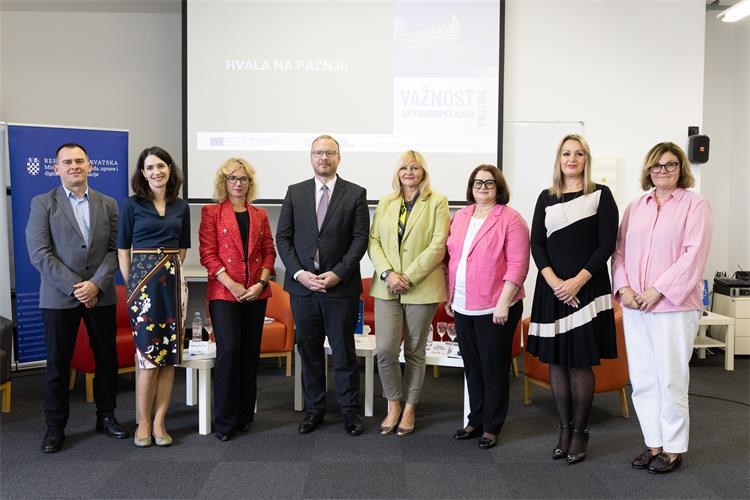Deputy Ombudswoman Dijana Kesonja participated in the roundtable organized by the Ministry of Justice, Public Administration and Digital Transformation on the topic “The Importance of Anti-Corruption Policies in the Context of Functioning at Local and Regional Levels”, held on Thursday, 26 September 2024, in Rijeka.
As a panelist in the session dedicated to the prevention of corruption at the local and regional level from the perspective of independent institutions, Deputy Kesonja presented the work of the Office of the Ombudswoman, with a focus on its mandate of protecting whistleblowers, which is closely linked to the field of combating corruption.
She explained that, under the Whistleblower Protection Act, the Ombudswoman is designated as the external reporting body for whistleblower complaints. Within this mandate, the Office receives reports concerning various irregularities and unlawful conduct in both the private and public sectors.
The Office forwards these reports to the competent authorities responsible for addressing the reported irregularities, such as the State Attorney’s Office of the Republic of Croatia, the State Inspectorate, the Tax Administration, and others, while ensuring the protection of the whistleblower’s identity and the confidentiality of information. Whistleblowers are subsequently informed about the actions taken by the authorities to which the report was submitted.
Furthermore, if there is a suspicion that the whistleblower is being subjected to retaliation for having reported one or more irregularities, the Ombudswoman initiates an investigation with the employer to determine whether any constitutional or legal rights of the whistleblower have been violated as a result of the report.
Speaking on corruption prevention through whistleblower action, Deputy Kesonja emphasized that a common issue is a lack of understanding of the legal provisions and the steps whistleblowers must take to exercise the rights and protections guaranteed under the Whistleblower Protection Act.
In order to fulfill the purpose of this Act and build trust among whistleblowers in its effectiveness, prompt and appropriate communication is needed between the Ombudswoman and the authorities responsible for handling the substance of whistleblower reports, so that whistleblowers are adequately informed about the status of their cases.
It is also important that confidential persons notify the Ombudswoman in a timely manner about the handling of internal reports of irregularities, so that the Office can monitor the implementation of the law in cases using this reporting channel and, if necessary, issue recommendations and undertake other activities to improve its functionality.
Proper application of the Act also depends on training for confidential persons and judicial officials, which is why the Ombudswoman has thus far organized a series of workshops and participated in educational sessions in several cities across Croatia, with additional sessions planned for the upcoming period.
Deputy Kesonja specifically addressed the need to provide emotional support to individuals who choose to report irregularities, which is of great importance given that some whistleblowers face significant stress. She noted that, at the beginning of September, the Centre for Stress and Trauma Rehabilitation began operating, where whistleblowers can seek this type of support.
In conclusion, Deputy Kesonja presented the Whistleblower’s Guide, prepared by the Office of the Ombudswoman to clarify the legal framework and facilitate the application of the Act. The Guide is primarily intended for whistleblowers, but is also useful for confidential persons, employers, lawyers, judges, providers of free legal aid, trade unions, and others.


